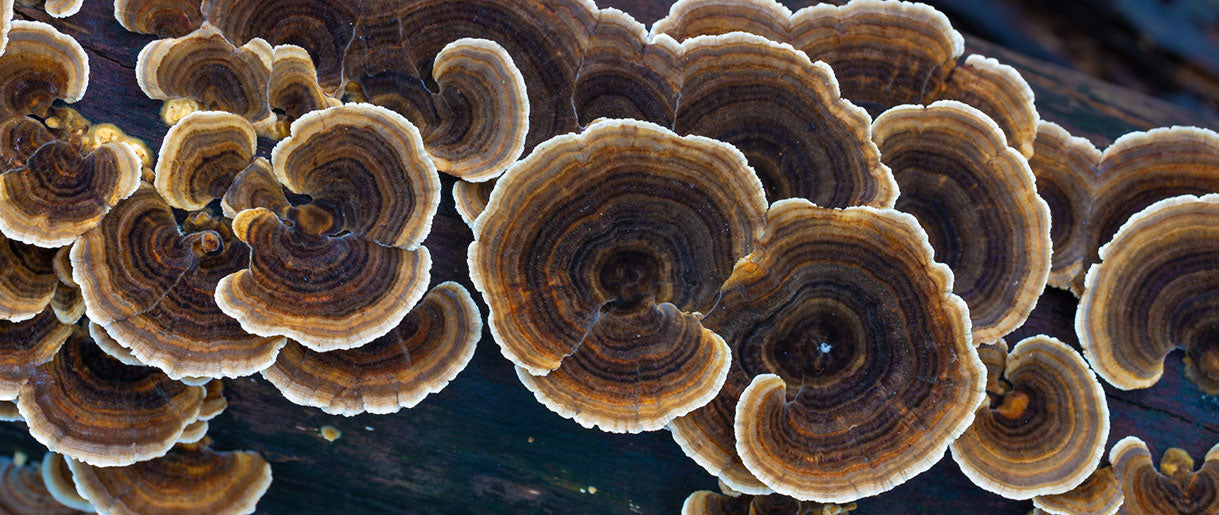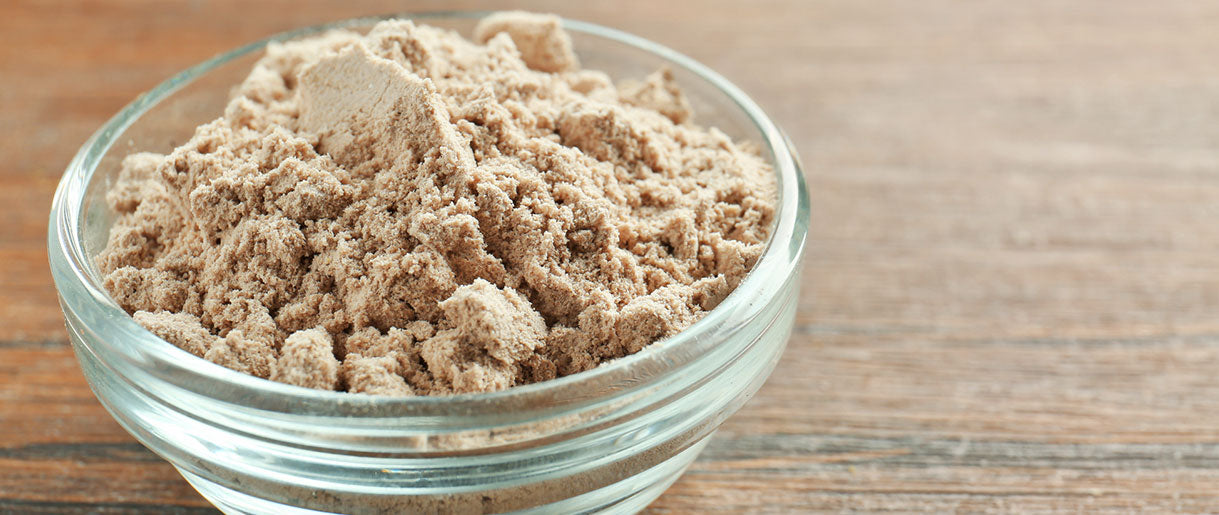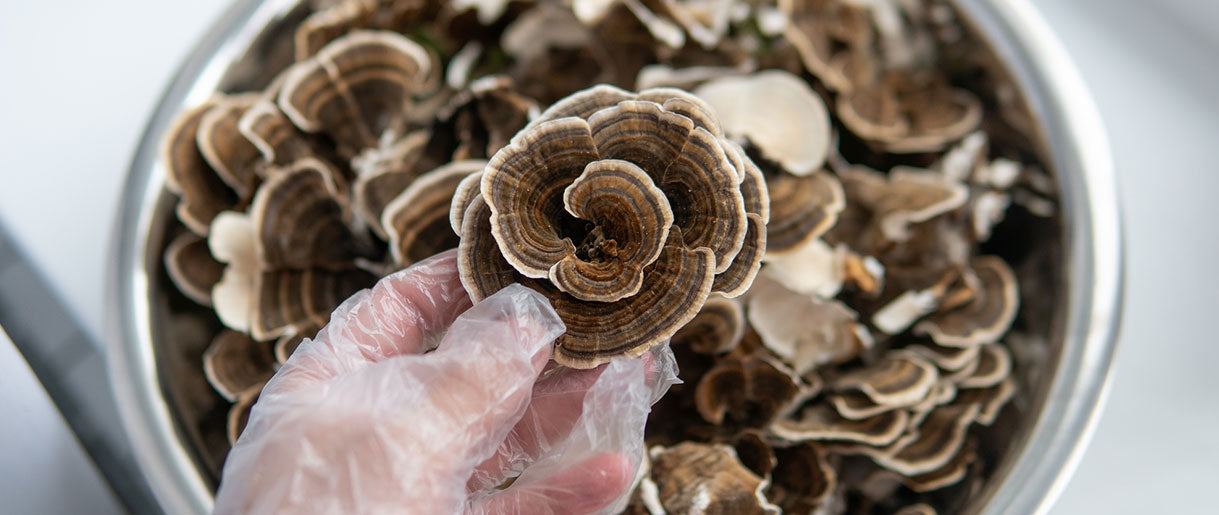The optimal dosage of Turkey Tail Mushroom (Trametes versicolor) may vary based on factors such as the individual's age, health condition, and the purpose of consumption. However, general guidelines suggest a daily dosage of 1-3 grams of the dried mushroom or 1-2 capsules (approximately 500 mg per capsule) if taken in supplement form. For those undergoing cancer treatment, studies have used doses of up to 9 grams daily.
It's important to remember that while Turkey Tail has numerous health benefits, it may also have potential side effects. Therefore, please consult your healthcare provider before starting any new supplement regime to ensure it's safe for you.
This article aims to delve deeper into understanding the nuances of Turkey Tail Mushroom dosage. We will explore the history and medicinal use of this potent fungus, discuss the health benefits that make it a popular choice in natural healing circles, and look at the scientific evidence that helps us understand optimal dosage. We'll also cover potential risks, side effects, and precautions when using this supplement.
A Tale as Old as Time: The Historical Use of Turkey Tail Mushrooms

Turkey tail mushrooms have a rich history of use in traditional medicine across various cultures. These mushrooms, known scientifically as Trametes versicolor, have been used for thousands of years, particularly in Asian countries. The most notable usage is in traditional Chinese medicine, where turkey tail mushrooms are revered for their potential to boost overall health and vitality.
The colorful, fan-shaped mushroom gets its name from its resemblance to a turkey's tail. The turkey tail mushroom grows worldwide, making it one of the most common functional mushrooms. It is not just beautiful to look at, but it's also packed with beneficial compounds, making it a mainstay in traditional healing practices.
Turkey Tail Mushroom in European Traditional Medicine
Interestingly, turkey tail mushrooms aren't restricted to the East. They were also part of European traditional medicine, which recognized the mushroom's health-enhancing properties. From boosting the immune system to supporting gut health, turkey tail mushrooms have significantly promoted overall health across continents.
The Science Behind Turkey Tail Mushrooms
Researchers have shown a keen interest in understanding the health benefits of functional mushrooms like turkey tail in recent years. Several studies have been undertaken to explore the benefits offered by both the mushroom mycelium and the fruiting body of this fascinating fungus.
One of the compelling findings from these studies(1) is the presence of unique polysaccharides - PSK (Polysaccharide K) and PSP (Polysaccharide Peptide). These compounds have shown potential benefits in supporting immune health, reaffirming turkey tail mushrooms' status as medicinal mushrooms.
Further, many studies have(2) focused on the turkey tail's cancer treatment benefits, given its immune-supportive properties. As science continues to unravel the mysteries of this functional mushroom, its historical reputation as a potent agent for overall health seems to be supported by modern research.
Turkey Tail Mushroom: A Treasure Trove of Health Benefits
Turkey tail mushroom, a significant part of the family of functional mushrooms, offers many health benefits backed by science. Several studies have identified turkey tail mushrooms as a powerhouse of beneficial compounds supporting the body's natural immune function, contributing to a healthy lifestyle, and even offering potential benefits for cancer patients.
Unlocking the Power Against Cancer

Among the functional mushrooms, turkey tail mushroom has been studied extensively for its role in combating various cancers. Notably, breast cancer, colorectal cancer, gastric cancer, lung cancer, and colon cancer have all been part of the research spectrum.
A biological response modifier, the turkey tail mushrooms, contains polysaccharides PSK and PSP that seem to have an inhibitory effect on cancer cells.These compounds, particularly PSK, have been used alongside conventional cancer treatments in Japan to improve the immune response in cancer patients.
Moreover, a randomized controlled study(3) found that oral consumption of turkey tail mushrooms improved the immune system of high-risk HPV patients, indicating potential benefits against oral human papillomavirus.
HPV is often linked to different types of cancer, including anal and cervical cancer. When used with other mushrooms for HPV—for example, Reishi mushroom—turkey tail could fight HPV, reducing the risk of cancer.
The Influence of Dosage on Cancer Benefits
The dosage of turkey tail mushroom intake significantly influences the impact of these health benefits. For instance, some studies suggest that a higher dosage might be more beneficial for cancer patients undergoing chemotherapy or radiation therapy. However, the exact dosage may depend on various factors, including the type of cancer and the individual's overall health.
Turkey Tail Mushroom for Blood Sugar and Weight Management

Beyond cancer, turkey tail mushrooms have shown promise in managing blood sugar levels and regulating body weight. The mushroom's prebiotic dietary fibers might help reduce blood sugar levels, potentially benefiting those with diabetes mellitus and mitigating insulin resistance. Turkey tail may facilitate weight loss when integrated into a healthy lifestyle.
Boosting Immune Health

Turkey tail mushrooms are rich in beta-glucans that can stimulate the immune system, increase the activity of natural killer cells, and reduce inflammation. Once again, the dosage plays a crucial role in reaping these benefits, underlining the importance of understanding optimal intake.
Determining Your Turkey Tail Mushroom Dosage: The Factors at Play

The optimal turkey tail mushroom dosage varies significantly from individual to individual. Several factors come into play, such as age, weight, health conditions, and the intended use of the supplement. For instance, someone using turkey tail mushrooms for their general health-boosting properties might require a different dosage than someone using it as adjunctive support for cancer treatment.
The Cruciality of Cancer Dosage: Studies on Turkey Tail Mushroom Cancer Dosage
The question of turkey tail mushroom cancer dosage or turkey tail mushroom dosage for cancer is particularly essential. Some research suggests that a higher dosage may be more beneficial for cancer patients. However, it is vital to consult with a healthcare provider before starting or adjusting any dosage related to cancer treatment.
Decoding the Optimal Dosage
While there isn't a one-size-fits-all answer, current scientific understanding provides a range for turkey tail dosage. A standard healthy maintenance dose of 1-3 grams of turkey tail supplements daily is often recommended. This can come in various forms, such as turkey tail mushroom tea, turkey tail mushroom powder, or turkey tail mushroom capsules.
Regarding turkey tail mushroom capsules, an average dosage often suggested is 1-2 capsules—each capsule usually 500 mg—daily. If you're wondering how much turkey tail extract to consume, it's best to follow the manufacturer's dosage instructions or consult a healthcare professional.
For those considering turkey tail mushroom dosage for cancer, studies have used doses ranging from 3-9 grams daily, but it should be under the strict supervision of a healthcare professional.
Navigating the Risk of Overdose
Like all medicinal mushrooms, while turkey tail mushrooms offer numerous benefits, an overdose can lead to side effects. Overdoing the turkey tail dosage may lead to digestive upset, darkening of the fingernails, or skin rash. Some individuals may also experience an allergic reaction to the mushroom powder or extract.
It's worth noting that taking turkey tail mushroom tea, mushroom powder, or turkey tail mushroom capsules should be considered a marathon, not a sprint. Gradually incorporating it into your routine and observing your body's reactions over time (up to three weeks) is advisable.
Making the Most of Turkey Tail Mushrooms: A Guide to Consumption

Regarding taking turkey tail mushrooms, several options can suit your lifestyle and preferences. From powders to capsules to extracts, each form has its own pros and cons, influencing your overall turkey tail dosage. Let's look at these different forms and understand how to use them effectively.
The Powder Power: Turkey Tail Mushroom Powder
Turkey tail mushroom powder often contains the whole mushroom ground into a fine powder. This form is versatile and can be mixed into foods, drinks, or even taken as a supplement.
The advantage of the powder form is that it contains the full spectrum of the mushroom's beneficial compounds, contributing to enhanced immune function. However, the taste can be a bit strong for some individuals, and measuring the precise turkey tail dosage might be challenging compared to other forms.
Capsule Convenience: Taking Turkey Tail Supplements
For those who prefer convenience or are not keen on the taste of the mushroom, turkey tail mushroom capsules or turkey tail supplements are a great choice. These are easy to incorporate into your daily routine, and knowing your exact dosage is straightforward.
However, checking the product's ingredients is essential to ensure you're getting high-quality turkey tail extract or turkey tail mushroom extract. Some supplements may also include additional ingredients that could affect the overall potency.
Efficacy in Extract: Turkey Tail Mushroom Extract
Turkey tail mushroom extract is a concentrated form that often comes in liquid or powder. It's typically more potent than the whole mushroom powder, which means you may need less of it to achieve the same benefits.
The extract is easy to add to drinks or meals, but its taste can be strong, like the powder form. However, due to its concentrated nature, the dosage is typically less than what you'd use with the whole mushroom or powder form.
How Form Impacts Turkey Tail Dosage
The form of turkey tail you choose can indeed impact your dosage. Capsules generally come in pre-measured doses, making it easy to keep track of your intake. Powders and extracts, on the other hand, require careful measurement to ensure you're taking the correct dosage.
No matter the form, starting with a lower dosage is recommended, gradually increasing as needed. As always, consult with a healthcare professional before beginning any new supplement regime, especially if you're considering taking turkey tail daily or using it for therapeutic purposes.
Special Considerations for Specific Health Conditions
For individuals with specific health conditions, particular caution is warranted. For example, you should avoid turkey tail and other mushroom supplements if you have a mushroom allergy.
Those with auto-immune disorders should also exercise caution. Since turkey tail mushrooms can stimulate the immune system, they might exacerbate symptoms in individuals with multiple sclerosis, lupus, or rheumatoid arthritis.
The Role of Healthcare Professionals
The importance of consulting a healthcare professional before starting any new supplement, including turkey tail mushroom dosage, cannot be overstated. A healthcare provider can guide you on the appropriate dosage based on your health needs and monitor for potential side effects. They can also advise whether turkey tail mushrooms might interact with your current medications.
FAQs About Turkey Tail Mushroom Dosage
Can I Take Turkey Tail Mushroom Daily?
Yes, you can generally take turkey tail mushrooms daily. Due to its immune-supporting properties, many people incorporate turkey tail mushroom into their daily supplement routine.
However, as with any supplement, the key is moderation. The appropriate daily dosage will depend on your age, weight, overall health, and the specific health benefits you're looking to achieve. It's always a good idea to start with a lower dosage and gradually increase, if needed, under the guidance of a healthcare professional.
Are There Any Dangers Associated With Taking Too Much Turkey Tail Mushroom?
While turkey tail mushrooms are generally considered safe, taking excessive amounts may lead to some side effects. These can include digestive discomfort, changes in stool color, and in rare cases, skin rash or darkening of the nail beds. It's also worth noting that high dosages of turkey tail mushroom may overstimulate the immune system, potentially worsening symptoms in individuals with certain auto-immune conditions.
That said, everyone's tolerance to turkey tail mushroom dosage can vary, and what may be excessive for one person could be acceptable for another. It's always best to start with a lower dosage and increase gradually, paying close attention to how your body responds.
Can I Use Turkey Tail Mushrooms As A Treatment For Cancer?
Turkey tail mushroom has been extensively studied for its potential benefits for cancer patients, particularly its ability to support the immune system. Some studies suggest that turkey tail mushrooms may improve survival rates and reduce side effects in cancer patients. However, it's crucial to understand that while promising, these findings don't mean that turkey tail mushrooms can replace traditional cancer treatments.
Turkey tail mushrooms should be considered a complementary approach alongside conventional therapies. Moreover, any use of turkey tail mushrooms in the context of cancer should be under the guidance and supervision of a healthcare professional. It's also important to note that research is ongoing, and our understanding of the full potential of turkey tail mushrooms in cancer treatment continues to evolve.
Key Takeaways
Navigating the proper turkey tail mushroom dosage involves considering various factors, from your age and health status to the specific form of turkey tail you consume. Each form, whether powder, capsule, or extract, has unique attributes and may impact your dosage and overall experience differently.
For individuals considering turkey tail mushroom supplements, remember that starting with a lower dosage is always best, gradually increasing as your body adapts. Most importantly, don't forget the invaluable role of a healthcare professional. Consulting with one before starting a new supplement regimen can offer personalized advice and monitoring that is vital for safe and effective use.
As we've emphasized throughout this article, while turkey tail mushrooms can offer numerous health benefits, they should be part of a balanced lifestyle, not a substitute for professional medical advice or treatment.
Now, we want to hear from you. Are you considering adding turkey tail mushrooms to your health routine? Do you have any experiences or insights to share? Leave a comment below. We'd love to hear your thoughts and continue this conversation on turkey tail mushroom dosage.
References
- Immunomodulatory Properties of Coriolus versicolor: The Role of Polysaccharopeptide, (1)https://www.ncbi.nlm.nih.gov/pmc/articles/PMC5592279/
- Trametes versicolor (Turkey Tail Mushrooms) and the Treatment of Breast Cancer, (2)https://www.ncbi.nlm.nih.gov/pmc/articles/PMC4890100/
- Control of oral human papillomavirus (HPV) by medicinal mushrooms, Trametes versicolor and Ganoderma lucidum: a preliminary clinical trial, (3)https://pubmed.ncbi.nlm.nih.gov/25271984/










Let Us Know Your Comments
1 Response
Ed Engelman | July 29, 2022
Unfortunately this article does not address appropriate doses of wild collected turkey tail mushrooms. I have been drinking tea that I make from turkey tail mushrooms for ten months now as an adjunct to standard medical treatment for prostate cancer. (I do use purchased turkey tail when my foraged supplies run low). Typically I use a 1/2 cup of chopped and packed turkey tail (ground in a coffee grinder) in 1/2 gallon of water steeping in a crock pot on the high setting for 18 hours (more or less). So far my bloodwork exceeds my doctor’s expectations based on my condition before any of my treatments began.